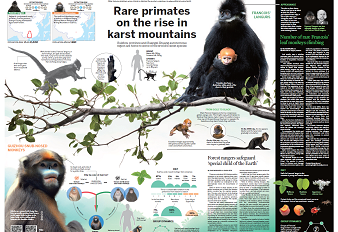Bare no more, Guizhou province's hills go green
Liu Xingsheng is busy picking fruits from plum trees growing in an unlikely spot on a rocky mountain.
The mountain is in Xinpu township in Guizhou province, a region long facing the threat of desertification.
For Liu, the most prominent geographic feature of his hometown has always been the rocky mountains, which were "as bare as if they had been burned by fire".
"The environment was harsh," said Zhang Xianghua, Xinpu Party chief, adding that the town's crops were mainly grown on dry land scattered between rocky mountains.
"The villagers here were all poor, with many living in thatched houses," the 49-year-old recalled.
In 2013, villagers began to take measures to control desertification, such as improving the condition of arable land, building small reservoirs and pumping stations, and building new roads.
Improved land conditions and infrastructure provided a foundation for industrial development. As a result, many villagers who had left Xinpu for better jobs elsewhere returned home.
Liu started planting plum trees in 2016. So far, he has planted 3 hectares of trees, two-thirds of which have borne fruit.
"When all the trees bear fruit in two years, my gross annual income will be over 400,000 yuan ($55,000)," he said.
So far, thousands of hectares of trees and cash crops have been planted in Xinpu.
"The village no longer looks desolate," Liu said. "The environment has significantly improved, and so have villagers' incomes."
Xinpu is a fine example of how Guizhou has made efforts to tackle desertification. The area affected in the province decreased from 37,600 square kilometers in 2005 to 15,500 in 2022.
Notably, the land area categorized as "severely" or "extremely severely" desertified has decreased by 60 percent.
Wang Yuansu, an official at Guizhou's forestry department, said the province has implemented a targeted strategy to control desertification based on severity.
Forestation and grass-growing efforts have made a difference in areas with severe desertification. In areas with moderate levels, locals have been advised to take up livestock farming.
In areas with better soil conditions, the government has helped promote the planting of fruit trees.
Wang's hometown, a remote county in Bijie city, was one of the areas most severely affected by desertification in the province.
"In the past, the mountains were bare and the soil eroded, leading fertility to decline," he said. "Now, they are covered in lush green vegetation."
京ICP备13028878号-8







 Overview
Overview Guiyang
Guiyang Guian New Area
Guian New Area Liupanshui
Liupanshui Anshun
Anshun Qianxinan
Qianxinan Qiandongnan
Qiandongnan Qiannan
Qiannan Zunyi
Zunyi Tongren
Tongren Bijie
Bijie Guizhou fosters cross-cultural bonds in Europe
Guizhou fosters cross-cultural bonds in Europe 18th Guizhou Tourism Industry Development Conference
18th Guizhou Tourism Industry Development Conference  Discover natural beauty in Qiannan, Guizhou
Discover natural beauty in Qiannan, Guizhou 

